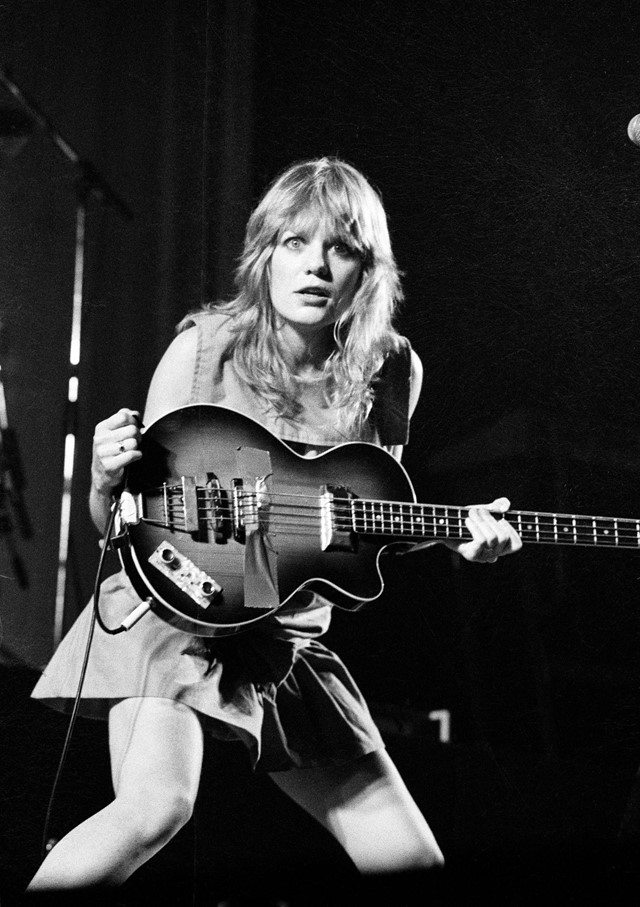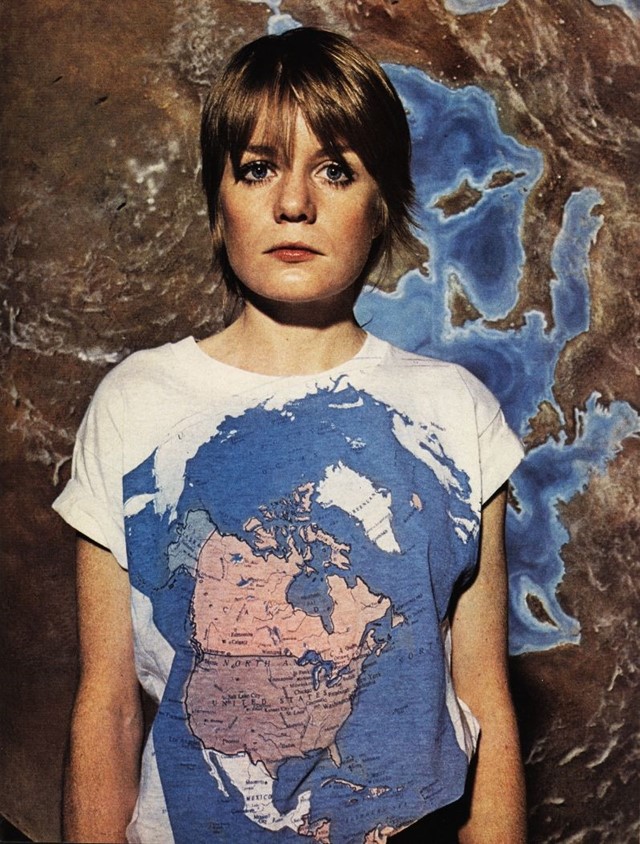Always more than just 'the girl in the band', Weymouth's idiosyncratic sound has secured her place in rock’s canon
Tina Weymouth has always been more than ‘the girl in the band’. As the singular bassist in frontman David Byrne’s art-pop group Talking Heads, and later in Tom Tom Club, Weymouth’s sonic funkiness and playful performance style proved essential to solidifying each band’s distinct sound and image. One could argue that Talking Heads wouldn’t have been Talking Heads without her – or, at the very least, they wouldn’t have been half as cool. In light of Stop Making Sense director Jonathan Demme’s death a few weeks ago, AnOther reflects on Weymouth’s remarkable life in music thus far.

Defining Features
Weymouth’s sartorial versatility truly comes into its own when she’s in her element strumming and strutting onstage. Whether rocking a band T, dark denim, and a boyish cropped cut or colourful tights beneath a mini dress, her fringed, sunshine yellow mane swinging wildly, Weymouth has never limited herself to a singularly defining look. While performing her hit Tom Tom Club single Genius of Love in Demme’s concert film, for instance, Weymouth’s neutral ensemble of a loose-fitting dress, tights, and knee-high boots provide the perfect contrast to her striking electric blue bass (especially once the strobe light breakdown kicks in). Other performances found her in more casual button-down shirts, trousers, and flats that appeared better suited for a nine to five office job than under the spotlight in a raucous club, but no matter, Weymouth found a way to liven up whatever she wore with her natural glow and insouciant spiritedness. Few photographs from her Talking Heads days feature her sans bass (essentially her mainstay musical accessory). Yet it’s the way she wields her instrument – confidently, playfully, and always with personality – that stands out as her most defining feature.
Seminal Moments
On the cusp of her teenage years, Weymouth, a California native, found an unexpected musical outlet: at 12, she joined a prestigious youth music group called Mrs Tufts’ English Handbell Ringing Group, which travelled across the mid-Atlantic United States performing medieval melodies and wearing Elizabethan garb. Yet her interests soon shifted to less archaic genres, namely rock ‘n’ roll and folk. A self-taught musician, Weymouth found inspiration in artists like Bob Dylan and Peter, Paul & Mary. In 1971, Weymouth met her future husband (and band mate) drummer Chris Frantz, while studying at the Rhode Island School of Design, where they shared a painting studio. Four years later, Talking Heads officially formed in New York City, and Frantz and Weymouth married in 1977 (and remain together, romantically and musically, to this day).
The trio’s pioneering sound, with its nods to funk, African, and Brazilian music, and eccentric onstage antics – from Byrne’s oversized suits to Weymouth’s memorable dance moves – brought them widespread acclaim and multiple records. However, it wasn’t until 1981 when the band took a breather that Weymouth found a sound all of her own. That year, she and Frantz co-founded Tom Tom Club, named in homage to the Bahamian dancehall where they rehearsed for the first time while on hiatus from Talking Heads, and released their dreamy, sonically dynamic and highly danceable debut record to rave reviews. It’s a testament to Weymouth’s talent that club favourite Genius of Love, which has been sampled by countless artists, including Mariah Carey and Grandmaster Flash, remains a timeless classic in 2017.

She’s an AnOther Woman Because…
Over the past four-plus decades, Weymouth – still a musician and now a mother of two – has remained open to life’s out-of-nowhere twists, while never losing sight of her equal parts collaborative and independent spirit, from meeting the man she would someday marry and play alongside during countless performances to joining a legendary band and, eventually, forming her own. Reflecting on her younger years, she once wrote in a letter to herself: “You think it would have been marvellous to have been born beautiful. Half a century later, you will realise you were lucky you were not – courage and perseverance being among the things you might have left by the wayside had it been easy to wow the boys at an immature age. Don’t trouble yourself worrying what other people might think of you. You’ll learn it really is none of your business... I would wish you to remember that brave new worlds call for brave young girls.” Weymouth’s effervescence, onstage and off, paired with her deeply held belief in music’s potential to move people – if only to step outside their heads and dance with abandon for a night – undoubtedly make her an AnOther woman.
